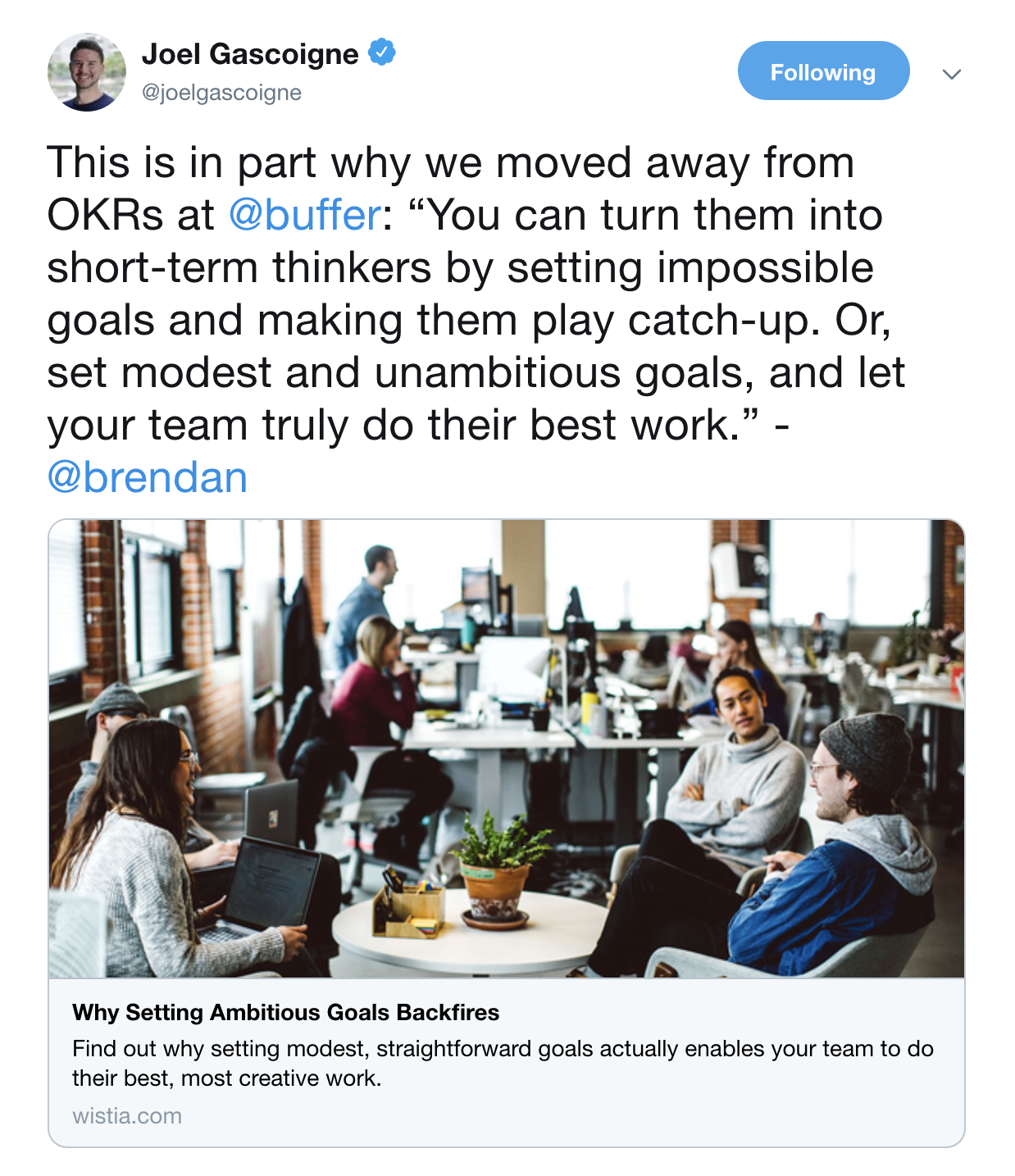A few tips to improve OKRs before it hurts your organization
OKRs are powerful, but they can also harm your culture and confuse your team. Here are simple things that you can fix before it breaks.

The Objectives and Key Results (OKRs) framework is rapidly gaining in popularity as a way to get teams more involved in the success of their companies. It introduces bottom-up ownership of results, and provides an excellent method to split the strategy between long-term focus areas and tactical outcomes.
I really like OKRs, but it can also be a dangerous sword to yield. A few companies have recently moved away from the traditional OKRs approach as it wasn't a good fit for them.

We've been lucky enough to chat with some great teams about their OKRs journey, and here are a few tips that emerged from our discussions.
Data-driven doesn't make you outcome-driven
There's a lot of emphasis on Key Results (KRs) in the OKRs literature. It makes sense because that's how you'll measure progress. But it's also one of the first sources of confusion about the purpose of OKRs.
If you focus too much on the KRs you'll end up with a team highly concerned about tracking metrics, and they'll move mountains to hit their targets. That will make you data-driven, for sure, but that won't mean that people understand why they're reporting on a particular set of KPIs.
If you want your team to be outcome-driven, you should start by getting everyone aligned on the Objectives. And if you have several levels of OKRs, you should make sure that the top Objectives exist in the lower-level OKRs as well.
Key Results are only there to give you a sense of progress. There will be times when you realize that you picked the wrong KRs for a particular Objective and it's okay. Just drop them. Objectives, on the other hand, should not change mid-quarter. They're setting the direction of your business, and they will be the anchor point for your teams.
If in doubt, one should be able to look at the Objectives and know what to focus on. The Key Results will provide more details, but they might not apply to everyone.
An Engineering team and a Sales team can both share a "Delight our customers" Objective. Things will then differ when it comes to the KRs. The Engineering team might focus on performance metrics and Net Promoter Score, while the Sales team might look at after-sales handoff and support.
Drop the ambitious Key Results
Brendan Schwartz, CTO of Wistia, wrote an excellent post about the danger of setting ambitious goals.
The OKRs model, as popularized by Google, suggest setting Key Results that will stretch your team. The idea is that getting to 70% of your goal is considered great, and getting to 100% should be exceptional and rare.
The first problem of that approach is that we've been taught all our life that completing something means 100%. Not 70%. Not 60%. So you're going to confuse the hell out of your team when you'll say that everyone should aim for 70% by the end of the quarter. The stretch model works for Google because they built their entire culture around it, but it's unlikely to make sense for your business. Brendan addresses it in length in his article but here are some of the things that will happen:
- Demotivation: no one likes to score below completion consistently. People need closure and it feels great to say you're 100% done.
- Suspicion: in the Google model, 100% is supposed to be so hard that the first reaction is almost to doubt you if you get there. "You got 100%? Must not have been ambitious enough..."
- Confusion: If 70% is supposed to be on track, then at which level do you consider yourself at risk or off track? This arbitrary model makes it hard to match completion to confidence. It sounds pretty weird to me to say that 35% is halfway there.
My recommendation is to set some targets that are realistic for your team. Getting to 100% should be great, feel great and be celebrated.
Have fewer KRs for more accountability
There are countless of metrics that you can use to measure success. But each new KR comes at a cost: you'll have to spend more time reporting on progress, and less time thinking about how you can make a difference.
Side note: Key Results should not be automated. The real value comes from the interpretation of the result. Are you where you expected to be? If not why? And do we need to do something about it?
At any level of OKRs (company, department, team), I like to use the 3x3 rule: 3 Objectives and 3 Key Results per Objective. That way you do not exceed 10 Key Results per level which makes it easier for people to understand where your focus is.
A simple question to help limit the number of KRs is "Would I do something differently if this KR was off track?". If the answer is no, then you can safely ignore it as it's not something you can act on.
Another rule of thumb: no one in your organization should have more than 5 KRs to update weekly. They might have other things to report on (strategic initiatives, project statuses...) but when it comes to the KRs that matter for the quarter, it should be limited. If not it will become a burden for them, and the quality of the feedback will drop significantly.
Make it OK to say you're KO
Lastly, you need to create a safe space for people to say that things are not going as expected. There should be a sole owner for each of the Key Results, but delivering outcomes is going to be a team effort. Don't use OKRs as a proxy to review individual performance (and don't use them for bonuses).
OKRs should be first and foremost about making sure that all efforts in your organization are going in a similar direction. Then it's about providing a simple way to assess if you're getting close to where you want to be.
That is why your team should not be afraid of reporting bad news. Otherwise, people will wait for the very last moment, and there won't be a chance to help. Heroes are great in movies but bad for businesses.
Create a culture of transparency where your team is not afraid to share their concerns — being accountable means caring and reporting on progress, good or bad. It's not about trying to fix everything by yourself.
What's next?
If you want to go more in depth, we have a written a series of posts to help adopt goal-setting and goal-tracking practices.
Tell us what you think and don't hesitate to ask questions in the comments or at team@tability.io - you can also find me on Twitter at @stenpittet.
Tability is a simple goal-tracking platform for OKRs, KPIs and projects. You can sign up today at https://tability.io.

